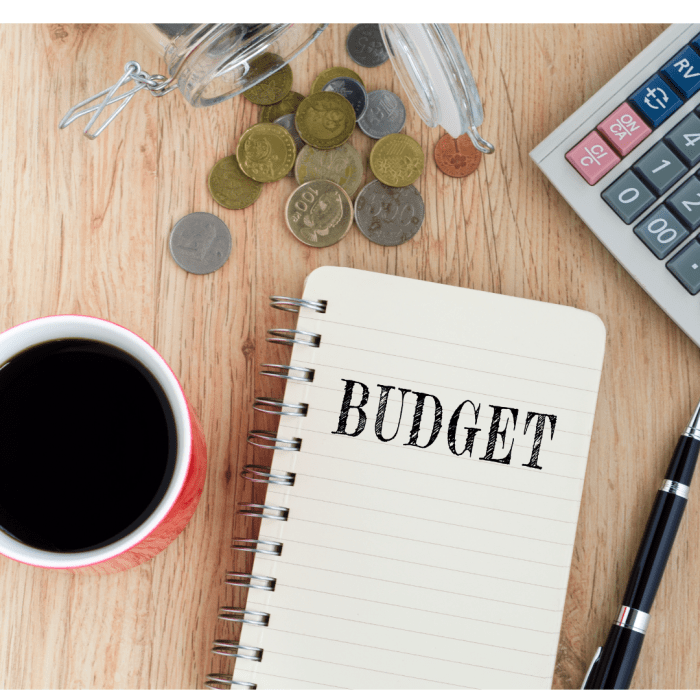Hey there, ready to dive into the world of budgeting? Whether you’re a seasoned pro looking to brush up on your skills or a newbie eager to learn the ropes, creating a budget is a crucial step towards managing your finances like a boss. Let’s explore the ins and outs of budgeting and get you on the path to financial success.
In this guide, we’ll cover everything from setting financial goals to tracking income and expenses, all the way to managing debt and savings. By the end, you’ll be equipped with the knowledge and tools to take control of your financial future.
Introduction to Budgeting
Creating a budget is crucial for managing your finances effectively. It helps you track your income and expenses, prioritize your spending, and work towards your financial goals.
Importance of Budgeting
- Allows you to control your money instead of it controlling you
- Helps you avoid debt and overspending
- Provides a clear picture of your financial health
Benefits of Having a Budget
- Helps you save for emergencies or future goals
- Allows you to make informed financial decisions
- Gives you peace of mind knowing where your money is going
Examples of Situations Where Budgeting is Crucial
- When you’re living paycheck to paycheck
- Starting a new business or pursuing higher education
- Planning for a major life event like buying a house or having a baby
Setting Financial Goals
Setting financial goals is a crucial step in creating a budget that works for you. By defining your short-term and long-term financial goals, you give yourself a clear target to aim for. This helps in prioritizing your spending and saving habits, leading to better financial decisions.
Identify Short-Term and Long-Term Financial Goals
When setting financial goals, it’s important to differentiate between short-term and long-term objectives. Short-term goals are typically achievable within a year, such as saving for a vacation or paying off credit card debt. On the other hand, long-term goals are more substantial and may take years to accomplish, like buying a home or saving for retirement.
Elaborate on How Financial Goals Help in Budgeting
Financial goals serve as motivation and a roadmap for your budgeting efforts. They provide direction and purpose to your financial decisions, making it easier to resist impulse purchases and stay focused on your priorities. By aligning your budget with your goals, you ensure that your money is being used effectively to achieve the outcomes you desire.
Discuss the Role of Goals in Creating a Budget Plan
Goals are the foundation of a budget plan. They help you determine how much you need to save, where you need to cut back on expenses, and what areas of your life require financial attention. Without clear goals, creating a budget becomes aimless and less effective. By setting specific, measurable, achievable, relevant, and time-bound (SMART) goals, you can tailor your budget to meet your individual financial aspirations.
Tracking Income and Expenses
When it comes to budgeting, tracking your income and expenses is crucial for staying on top of your financial situation. By monitoring your cash flow, you can make informed decisions to reach your financial goals.
Design a template to track income and expenses
Creating a template to track your income and expenses can help you visualize where your money is coming from and where it is going. You can use software like Excel or Google Sheets to create a simple spreadsheet or download budgeting apps to streamline the process.
Organize a system for recording financial transactions
Establishing a system for recording your financial transactions is essential for accurate tracking. Whether you prefer to keep physical receipts or use digital methods like scanning receipts or tracking expenses through apps, find a method that works best for you and stick to it consistently.
Discuss the significance of monitoring cash flow for budgeting
Monitoring your cash flow allows you to see patterns in your spending habits and identify areas where you can cut back or reallocate funds. By keeping a close eye on your income and expenses, you can make adjustments to your budget as needed to stay on track towards your financial goals.
Creating a Budget Plan
Creating a budget plan is essential for managing your finances effectively. It involves setting financial goals, tracking income and expenses, and allocating funds for different expense categories.
Steps Involved in Creating a Budget Plan
- Calculate your total monthly income: Add up all your sources of income to determine how much money you have coming in each month.
- List your expenses: Make a detailed list of all your monthly expenses, including fixed expenses like rent and utilities, as well as variable expenses like groceries and entertainment.
- Determine your financial goals: Decide what you want to achieve with your money, whether it’s saving for a big purchase or paying off debt.
- Choose a budgeting method: Consider using zero-based budgeting, where every dollar is assigned a specific purpose, ensuring that all income is allocated towards expenses, savings, or debt repayment.
- Track your spending: Keep a record of your expenses to see where your money is going and identify areas where you can cut back.
- Adjust your budget as needed: Review your budget regularly and make changes as necessary to meet your financial goals.
Examples of Budgeting Methods
- Zero-based budgeting: In zero-based budgeting, you allocate every dollar of your income towards expenses, savings, or debt repayment, leaving no money unassigned.
- 50/30/20 budget: This method involves allocating 50% of your income towards needs, 30% towards wants, and 20% towards savings and debt repayment.
Allocating Funds for Different Expense Categories
When allocating funds for different expense categories, prioritize essential expenses like housing, utilities, and groceries. Then allocate a portion of your income towards savings and debt repayment before spending on discretionary items like entertainment and dining out.
Managing Debt and Savings

When creating a budget, it’s essential to consider not just your income and expenses but also how you manage debt and savings. By effectively handling debt and prioritizing savings, you can achieve financial stability and work towards your financial goals.
Strategies for Managing Debt within a Budget
Managing debt within a budget requires a strategic approach to ensure that you can pay off debt while still meeting your other financial obligations. Here are some key strategies to consider:
- Identify all outstanding debts and their interest rates to prioritize which to pay off first.
- Allocate a specific amount of your budget to debt payments each month to ensure steady progress.
- Consider debt consolidation or negotiation with creditors to lower interest rates or monthly payments.
- Avoid taking on new debt while focusing on paying off existing debts to prevent further financial strain.
Importance of Including Savings in a Budget
Incorporating savings into your budget is crucial for building an emergency fund, planning for future expenses, and achieving long-term financial security. Here’s why savings should be a priority:
- Emergency savings can provide a financial safety net in case of unexpected expenses or income loss.
- Saving for specific goals like a down payment on a house or retirement allows you to work towards achieving these milestones.
- Regular savings contributions help you develop good financial habits and ensure you’re prepared for future financial needs.
Tips for Prioritizing Debt Payments and Savings Contributions
Deciding how to allocate your budget between debt payments and savings can be challenging. Consider these tips to strike the right balance:
- Allocate a portion of your budget to debt payments based on the interest rates and outstanding balances of your debts.
- Set specific savings goals and prioritize contributions towards these goals to ensure steady progress.
- Automate debt payments and savings contributions to make sure they are consistently addressed each month.
- Reassess your budget regularly to make adjustments based on changes in income, expenses, or financial goals.
Adapting and Reviewing the Budget
When it comes to managing your finances effectively, adapting and reviewing your budget regularly is crucial. As your financial situation changes, your budget needs to reflect these changes in order to remain relevant and effective. By reviewing and adjusting your budget periodically, you can ensure that you are staying on track with your financial goals and making the most of your income.
Factors to Consider for Budget Modifications
- Income Changes: If your income increases or decreases, you will need to adjust your budget accordingly. This could be due to a raise at work, a bonus, or even a job loss.
- Expenses Fluctuations: Changes in expenses such as rent, utilities, or groceries can impact your budget. Keeping an eye on these fluctuations and adjusting your budget can help you stay on top of your finances.
- Unexpected Costs: Emergencies or unexpected expenses can arise at any time. Having a buffer in your budget or reallocating funds from other categories can help you cover these costs without derailing your financial plans.
- Financial Goals: If your financial goals change or evolve over time, your budget should reflect these changes. Whether you are saving for a major purchase, planning for retirement, or paying off debt, adjusting your budget to align with your goals is essential.






